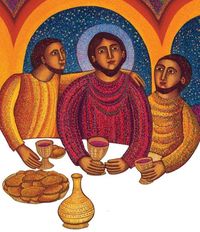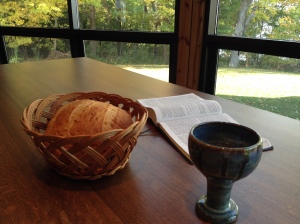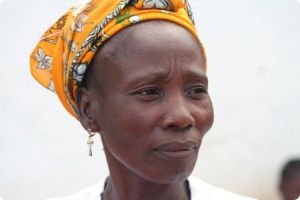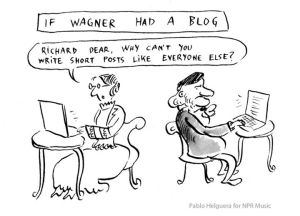Public persona and permeable boundaries
One of the challenging and delightful discoveries for me in Click2Save
is the possibility that I might loosen my death grip on my personal life as a private entity and share my story more freely on Facebook. The suggestion that people in the congregation might be helped by knowing me as a real person was a revelation to me. As I thought about the folks that already comment on my personal Facebook page, I realize that they were learning from and about me, sharing struggles I have, celebrating life transitions. And I have been commenting on their trials, joys, questions and celebrations. We were pilgrims on a journey together.
Perhaps I have been so intent on protecting myself that I have blocked opportunities for sharing the good news, witnessing to my faith and listening to others. I feel that my recent engagement in Facebook has allowed me to show myself and hear others. One post I share regularly is an evening prayer from the Episcopal Church–it always gets a response, but more to the point it reminds me to pray before I go to bed at night.
Click2Save has been extremely helpful to me. I love the practical advice. I can use it as I work on my own media presence and consider our mission and message at the church. I like the notion of moving from novice to oblate to superior. I plan to take my vows very soon.
Resilience, exuberance and problem-solving, oh my!
In the course of twenty minutes during this Ted Talk, I have evolved from an ignoramus about gaming to a believer in the possibility of “epic wins” for humanity and global problem solving. Jane McGonigal’s convincing anecdotes, statistics and optimism accelerated my change of heart and mind as she spun out the story of gaming and its possibilities. Because of a compelling sense of urgency, structured social interaction, confidence, tireless engagement, and several dopamine squirts, the gamer is able to tackle, persevere, and celebrate wins that would seem too daunting in “real life.” McGonigal asserts that the transferable learning from these exercises could save the world–or at least address real problems—especially if the content of these games starts to mirror actual crises and conundra challenging us in the 21st century.

How will we in the faith community harness some of that energy that jumped off the screen depicting the gamer on his way to an epic win? Will we be able to provide a platform, a safe space, room to dialogue, a place to play and invent and imagine? Or will we be tsk-tsking as we suggest a better use of 10,000 hours to reach mastery? Can we coopt this kind of natural energy without damaging the fun and freedom that people experience while playing? If we make it more purposeful, does it just seem like a Calvinist trick?
I have to admit that I know of nobody in my church who plays World of Warcraft.
But I am going to find out more as soon as I get home.
Muddling along in Moodle
I am still curious about the irony– or at least the disconnect—in Jennings’s use of academic, abstruse language to convey his message. I know that gives him credibility within the academy, giving his work a definite gravitas, but it also prolongs the use of language that itself colonizes, partitioning off those people on the street who may earnestly want to shake off the inheritance of whiteness and learn about how to reappropriate the Gospel in their own language. While his demeanor is folksy and friendly, his syntax and supercilious attitude toward the writings of others communicate a distancing from the very joining he advocates.
Does anyone else feel this dissonance?
Posture and Ritual
In Chapel on opening day this week, Virstan Choy preached from Judges 7:2-7, retelling the story about how Gideon was called by God to sift out worthy warriors by observing their posture as they leaned in to drink the water. Those who remained in an upright position as they drank signaled their ability to stay alert and attentive, thus indicating their worthiness as vigilant warriors.
This foray into Gideon’s story made me think about posture and its role in our collective story as a people of faith.
+ What do our postures in worship–as leaders and as congregants–say about us?
+ What does our everyday posture say about our stance before God our Creator?
+ Why does “posturing” have a negative connotation? Is it possible to “posture” authentically, mindfully, positively?
As I think about people sitting quietly in the pew in the predominantly white North American Protestant church I serve, it’s hard to connect their inert posture with the institutional posturing of our Christian missional history–a history that colonized indigent peoples and cannibalized their traditions as our forbearers conflated white identity formation with theological formation, insisting that the newly converted fit into an ecclesial mold patterned after white European (male) culture (Jennings, The Christian Imagination)in a sweeping act of “unconscious incompetence” (Choy paradigm) that assigned superiority, blessing, and messianic righteousness to their endeavor.
That historical posture is so far from my understanding of the Gospel. Instead I see Jesus standing up for the downtrodden; God choosing, sheltering, and guiding the Israelites; the prophets railing against injustice; and the disciples healing, teaching and astonishing people with the good news, the great reversal. The Biblical stories seem to balance the complementary narrative forms described in Foley and Anderson’s book, Mighty Stories, Dangerous Rituals. These faith stories both “mediate irreducible opposites” as myth and “disrupt and challenge the perception of a well-ordered universe”(Anderson and Foley). That’s why the stories are so powerful.

And our ritual of worship weekly rehearses that balancing act through praise, confession, assurance, proclamation, response and sending people forth to take a stand in the world–standing up for justice, standing by those who are disenfranchised, standing with those who protest or suffer or worry or work. In my understanding of liturgy (Gr. The work of the people) worship prepares us for that posture in the world.
Yet when I honestly look at the congregation on a Sunday morning, it seems that the story-telling, the powerful shared narrative really happens at coffee hour between services. Is there posturing here? Perhaps. We do want to put our best story forward. But I see people co-authoring their life narratives in the Gathering Space with coffee cups more authentically than I see them participating in the holy narrative over communion cups.

Is that cynical or realistic or just what it is? I see people with internal purpose, making sense of the world, and with the external purpose of communicating themselves to one another (Anderson and Foley) in coffee hour. I cherish that vision of parishioners in shared conversation, coffee cups in hand, kids swirling around them, as an authentic ritual. But I wish it happened more clearly in worship.

We have this posture of community, a shared “meal” or coffee, in common with people all around the world who tell stories this way. Can we learn from their posture of worship, as well? Because in many cultures, worship is not a passive, receiving experience, but a dynamic, on your feet, dance-forward-with-your-offering, swing, sway and clap-with-the-music event. It’s time we, in our insular whiteness, learned from the spirit of indigenous and global Christians. Like vigilant “warriors” we should sit up and pay attention, drinking in this world wide wisdom and standing up and stretching our worship posture.

Interestingly, an article on NPR this same week reported that we also have something to learn from indigenous cultures about physical posture. It seems that first world folks have poor posture because many of us are not doing hard manual labor, nor do we carry jugs of water and baskets of clothes on our heads, or balance babies on our hip as we work.
As we look around and learn from others, may our learning infiltrate our shared narrative so that:
+ our worship posture is humble and yet dynamic and bold;
+ our coffee conversations are not “posturing” about a myth of happily ever after but mediate authentic selves;
+ our missional life beyond the Sunday morning ritual is honest–acknowledging pain, participating in acts of mercy and standing tall as we carry the precious goods of the gospel on our heads and in our hearts.

